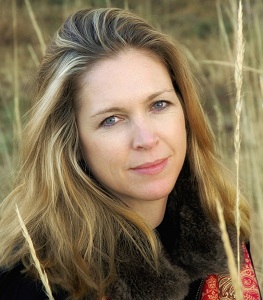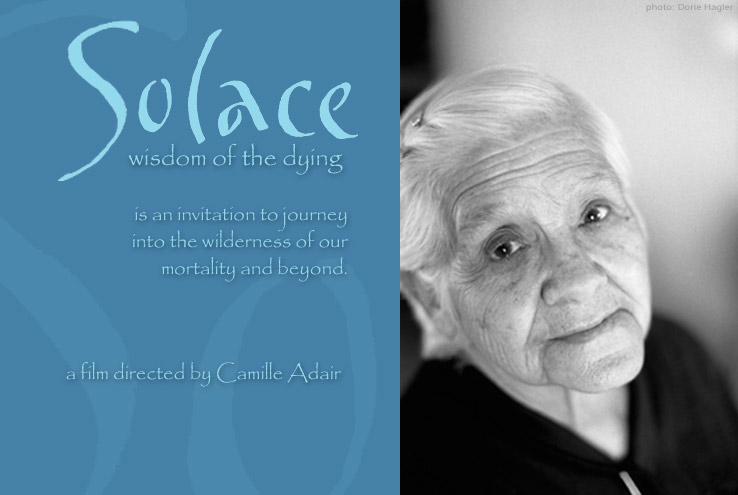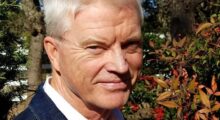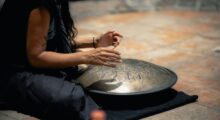 Today, I talk with Camille Adair, the filmmaker behind the SOLACE Project. Camille’s background is in hospice, where she has worked as a nurse case manager, clinical liaison, patient care manager, and the director of education for a healthcare organization in New Mexico. Her first film, Solace: Wisdom of the Dying, was inspired by her work at the bedsides of hospice patients facing death.
Today, I talk with Camille Adair, the filmmaker behind the SOLACE Project. Camille’s background is in hospice, where she has worked as a nurse case manager, clinical liaison, patient care manager, and the director of education for a healthcare organization in New Mexico. Her first film, Solace: Wisdom of the Dying, was inspired by her work at the bedsides of hospice patients facing death.
The response to the film inspired Camille to expand the project, which is now a twelve-part film series, The Solace Teachings. The program is available in a variety of formats, including A Year of Solace, where participants are guided through the program in a year-long monthly teleconference. She continues to learn about the end-of-life experience through filmmaking and her podcast.
Dana: Can you give an overview of the SOLACE project for our readers who aren’t familiar with it?
Camille: The SOLACE Project started in 2003. While I was working as a hospice nurse in New Mexico, I started to feel blown away at how much I was learning and experiencing. The [death] experience was really challenging and really beautiful. None of this was talked about in nursing school,and it’s not talked about culturally.
The lessons that we have to learn from dying people are very important for the living as well. We’ve, in a way, become sort of soulless as a society – we keep our sick and elderly and dying shut away, and I think we suffer because of that. I wanted to bring some of the positive aspects of that out. In the documentary, I didn’t focus much on pain and suffering, but most of the documentary is speaking to the opportunities available at the end-of-life.
After the documentary screened in 2008, I was flooded with emails and letters saying, ‘We haven’t seen anything like this, where death is talked about like this’. People asking for more.
I decided to create a doc series, that was called ‘A Year of SOLACE’. It started as a pilot project, and this series went into much more depth into some of the issues. Now they are part of an entire program called SOLACE Teachings, which will be available soon as a collection.
Dana: What will the program entail?
Camille: There are eleven additional documentaries, ranging from 45 minutes to almost 90 minutes. These are all fairly substantial, whereas the first documentary was more conversations with patients and some nurses, etc. The ‘Teachings’ starts out with taking a look at hospice and the palliative care industry. We did interviews with a lot of hospice nurses and palliative care physicians, gathered the perspectives of people working in the field. There are some patient interviews, but ‘Teachings’ focuses more on experts than patients.
The series also goes into compassion, surrender, solutions, green burial, home funerals.
I also look into a topic that’s of special interest for me: the inherent [predisposition to] wounding that is part of being a caregiver. As a nurse I found a statistic that is shocking: 83% of all nurses are female first-born child of alcoholics.
I think when you put so many people together who have similar [personal] wounds, it’s a recipe for a lot of stress, confusion, sometimes even abuse. I believe that the whole healthcare industry prays on this archetype – healthcare workers a lot of times have trouble setting boundaries. This plays into bullying in the workplace. We need to recontextualize our relationship to the profession, so it’s a healing process for us [nurses] as well.
Dana: What do you think draws wounded people to nursing, and how does that affect healthcare?
Camille: We end up being drawn to what we need the most – if we need care and healing, we are drawn to a place where we provide that for other people (even if that healing means healing into death). We have automatic blind spots when it comes to our own wounding.
When it comes to the content for the SOLACE teaching programs, the final one is closest to my heart. I talk about a new paradigm in healthcare – what healthcare would look like if medicine were based on our most current science. Currently it’s based on Newtonian science, which says if you can’t see something or touch it, it doesn’t exist.
When you work with people who are dying, you deal with a whole different realm. What would medicine be like if it were based on what we know from Quantum Physics? I believe hospice can be a leader for changing healthcare. It’s sacred ground.
Dana: Is that something you see as a hospice nurse, dealing with that other realm?
Camille: You deal with people who are seeing the other realm. As a worker you have to deal with the other realm. It calls on you to work with not only what you can see, touch, and feel.
There are ancient traditions and ancient wisdom that we could bring back that match up with this new science.
 Dana: What do you think healthcare would look like if it were based on that?
Dana: What do you think healthcare would look like if it were based on that?
Camille: I don’t think our clinical pathways would be so medically driven. Right now, they are largely pharmaceutically driven. The new paradigm is going to be much more about the human being. I know that is over-simplified, but it will be about the human experience and the individual, instead of so prescriptive.
Already more complementary and alternative therapies are being used.
Dana: Is there a connection with our resistance to dying and how we handle medical care (this pharmaceutical approach)?
Camille: The pharmaceutical approach is the ‘fix-it’ approach. Sometimes the hardest lesson for healthcare workers is that with dying people, you just have to be present. Just being present has an amazingly potent therapeutic value.
I’m not downplaying symptom management, but it’s a bigger picture than that.
Dana: Is the SOLACE Project, the education you offer, leaning in that direction?
Camille: We’re asking people to wake up to the fact that we do die.
In fact, there’s the truth that we do die, and the truth that we don’t die, so we’re trying to figure out, ‘How do you balance those truths?’ We’re called to look at immortality and eternal spirituality. I call on people to look at both. We need to do that, as we are preparing to ease our own suffering and the suffering of others.
Dana: Having that knowledge is an important part of easing suffering?
Camille: Yes.
With the changing demographics, this will be more important. We face a hugely expanding aging population, in the next few years, and we won’t have the workforce or the facilities to deal with this dying population.
Dana: We’ll be forced to face it.
Camille: Right! I’m hoping the Baby Boomers will bring to the table what they brought in the ’60s around radical change – this time around dying. They’re the generation to make that paradigm shift.
You can learn more about Camille at camilleadair.com and about the SOLACE Project at solacethemovie.com.

 What is the SOLACE project? – An Interview with Camille Adair
What is the SOLACE project? – An Interview with Camille Adair


 NDE Expert Peter Fenwick Left a Legacy That Continues to Inspire
NDE Expert Peter Fenwick Left a Legacy That Continues to Inspire

 Our Monthly Tip: Consider Live Music for a Celebration of Life
Our Monthly Tip: Consider Live Music for a Celebration of Life














